AMA
ONLY EVER SPOKE the truth. He was grateful for the smallest favour received
from others but never took offence from their actions. He understood people and
knew how to encourage and correct them, so that they felt appreciated when they
were with him. He always kept a positive outlook on life and had a natural
sense of the right time and place for everything.
Although
he was already far advanced in knowledge he continued to study science,
politics and economics, as well as military arts. He wanted to protect his
people from all harm, so he learned battle strategies and military command, and
in personal combat none could defeat him. Besides all this he still found time
to enjoy himself and was a keen patron of music and the arts and an
accomplished rider. For all these reasons he shone before all like the Sun god,
and all his people loved him.
 Not
surprisingly, of all his sons Dasaratha loved Rama the most. Emperor Dasaratha
was getting old, and seeing how well Rama was doing he decided to pass control
of the kingdom over to him. Bad omens had been seen recently, which further
convinced him that he should place responsibility for the kingdom into younger
and more capable hands. He called together his ministers and advisers and put
it to them that it was time to hand over to Rama, but he did not invite Bharata
to be present. One reason for this was that Bharata was far away, staying with
his uncle Yudhajit, in the state of Kekaya. But there was another reason.
Dasaratha had once promised to Kaikeyi's father that her son would be crowned
king of Ayodhya. In view of this, he thought it best not to give Bharata the
opportunity to object to Rama's coronation.
Not
surprisingly, of all his sons Dasaratha loved Rama the most. Emperor Dasaratha
was getting old, and seeing how well Rama was doing he decided to pass control
of the kingdom over to him. Bad omens had been seen recently, which further
convinced him that he should place responsibility for the kingdom into younger
and more capable hands. He called together his ministers and advisers and put
it to them that it was time to hand over to Rama, but he did not invite Bharata
to be present. One reason for this was that Bharata was far away, staying with
his uncle Yudhajit, in the state of Kekaya. But there was another reason.
Dasaratha had once promised to Kaikeyi's father that her son would be crowned
king of Ayodhya. In view of this, he thought it best not to give Bharata the
opportunity to object to Rama's coronation.
After
thousands of years in the service of my people my body is worn out and my mind
exhausted,' Dasaratha's voice rumbled like distant thunder. 'I now wish to
install Rama as king.' He paused. 'Does anyone wish to speak?
The
assembly shifted uneasily. They had to choose their words carefully. How could
they show their enthusiasm for Rama without appearing to suggest that the
emperor was indeed growing old?
Mother
Earth wants Rama as her guardian,' spoke up Vasistha, 'therefore she has
inspired you to think in this way. if it is her wish and yours, then it is also
ours. Let Rama be our protector.' Dasaratha seemed pleased with his answer.
Then
let us make haste. Now is a good time for the ceremony. The trees are in
blossom and spring is upon us.'
So it
was decided. Priests were sent for and hasty preparations began. Ingredients
were gathered: white flowers from the meadows, dried paddy, grains, curds,
ghee, honey, fragrant oils, gold and precious stones.
Call
the royal guard, decorate the gateways let the dancers perform. Tomorrow the
moon stands in conjunction with the auspicious star Pusya and there is no time
to lose,' decreed Dasaratha. When all was underway he called aside his personal
assistant, Sumantra, and spoke quietly to him, 'Bring Rama to see me.'
Rama
prostrated himself full-length before his father and waited for the familiar
touch of his hand. Dasaratha drew his son to him and hugged him long before
sitting him on an ornate seat. He loved to look at Rama.
I am
getting old. I have done all I had to do for the gods, the sages, the Brahmans,
the people and for myself'. But still there is one thing that remains: I must
install you as my successor. I have decided that you should be crowned king.
The date for your coronation is fixed for tomorrow.
Rama
listened quietly, taking in his father's words. He enjoyed life as a royal
prince and had no wish for this sudden change. But his father's word was law
and his deep sense of duty and his love for the old man who had always shown
him such affection bound him absolutely. To question his wishes would be unthinkable.
Always
be humble, control your senses and avoid anger. Lay up stocks of wealth and
food grains. Keep your courtiers happy.' Dasaratha went on with his good advice
while Rama listened respectfully. When the interview was finished, he hurried
home to tell Sita the news.
Meanwhile,
news spread through the city. As Rama returned to his house crowds pressed
around to congratulate him. He arrived home and was searching for Sita to tell
her about the coronation when he was surprised to see Sumantra again and to
hear that the emperor had called for him a second time. Concerned, he hastened
to his father.
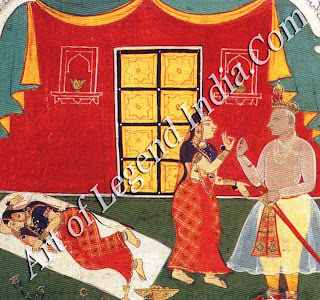 My
dreams are troubled by omens, meteors have been sighted, and my astrologers
have warned that the planets are against me,' Dasaratha told him. 'They say I
must take advantage of tomorrow's favourable moon to crown you before it is too
late. I am worried about Bharata. He is your loyal and honest brother and he is
far away, but he may lay claim to the throne.
We must be on our guard tonight. To ward off bad for-tune you and Sita
should observe a fast through the night and sleep on the bare floor.
My
dreams are troubled by omens, meteors have been sighted, and my astrologers
have warned that the planets are against me,' Dasaratha told him. 'They say I
must take advantage of tomorrow's favourable moon to crown you before it is too
late. I am worried about Bharata. He is your loyal and honest brother and he is
far away, but he may lay claim to the throne.
We must be on our guard tonight. To ward off bad for-tune you and Sita
should observe a fast through the night and sleep on the bare floor.
Quickly
now Rama went in search of Sita. He found her attending his mother in the
temple. Kausalya had long wanted her son crowned, and now her prayers had been
answered. Silently she sat in grateful meditation on Vishnu, the Lord of the
Heart. Becoming aware of her son's presence, she joyfully embraced him. '
0 Rama,
may you live long, and may your enemies be destroyed! Now all my sacrifices and
prayers to Lord Vishnu have been fulfilled.
Lakshmana
came in and bowed. Rama put his arm around him and said, 'Rule with me. This
blessing is for both of us.' Then taking leave, he and Sita made their way
home.
THE AVATARS OF VISHNU
TFIE
TEN incarnations, or avatars, of Vishnu are a recurrent theme in Vedic
literature. Vishnu enters this world to restore its balance, described below by
Krishna, the original Vishnu
Whenever
there id a decline in religion, and a rise of irreligan, I incarnate myself. To
protect the good, to destroy the wicked, and to re-establish religious
principled, I appear in every age.
The ten
avatars of Vishnu are: Matsya the fish, who saved all creatures from the
universal flood; Kurma the tortoise, who helped the gods gain immortality;
Varaha the boar, who rescued the earth from the bottom of the universe;
Narasimha the man-lion, who killed the demon Hiranya Kasipu; Vamana the dwarf,
who defeated the demon Bali; Parasurama, who defeated the war-like kings; Rama,
who killed the demon Ravana; Balarama, brother of Krishna; Buddha, who taught
compassion; and Kalki, who will come at the end of time to vanquish evil and
inaugurate a new cycle of the universe.
At
Rama's palace there were scenes of celebration. Soon Vasistha arrived, sweeping
up to the inner gate in his chariot and hurrying inside. Dasara.tha had sent
him with further counsel. '
There
is no going back on this now, Rama. It is most important that you observe the
fast according to the proper rules given in the sacred texts.'
After
Vasistha left, Sita and Rama lit a sacred fire and made offerings to Vishnu.
Then they spread grass mats on the bare floor of the temple and lay down to
sleep, thinking only of Lord Vishnu.
TREACHERY
Manthara
stood on the roof' of the royal palace surveying the scene below. She had heard
nothing about Rama's coronation, but she could tell from the flags, the
freshly-watered streets, the commotion and noise that something was happening.
Have
you heard? Tomorrow the emperor is to install Rama on the throne.' The words,
spoken joyfully by Rama's old nurse, who had just appeared on the roof, hit
Manthara's ears like a thunderclap. To her alone in Ayodhya this news was not
wonderful. She was Queen Kaikeyi's aged personal maidservant. When Kaikeyi had
married Dasaratha, Manthara had come with her as part of' the royal household
and she was fiercely loyal to her mistress, particularly as her deformity gave
her few other friends: she was a hunchback.
She
hurried down to find her mistress as usual reclining in her bedroom.
Get
up!' she scolded. 'This is no time to sleep. Your luck is about to evaporate
like a river in the dry season. In the absence of your son Bharata your
deceitful husband plans to install Rama on the throne. You must act quickly to
protect your rights!' Kaikeyi was bemused at this statement. She looked upon
Rama as her own son. His good fortune was hers, and would be shared with all
his brothers.
You are
the bearer of joy, Manthara. Why should I be unhappy to hear this?' 'Foolish
woman, what is there to celebrate? Don't you see? Once Rama is king your son
will be powerless and you will be forced to serve Queen Kausalya.' Manthara
knew that Kaikeyi, as the youngest of Dasaratha's wives, was not fond of
Kausalya. But these words made Kaikeyi indignant.
Rama is
full of virtue and deserves to be king. Besides he is the eldest brother and it
is his right. He will look after Bharata and me as he would his own mother.
Already he serves me more than he does her. Anyway, Bharata can still be king.
After a hundred years when Rama retires, he will hand over to Bharata, as
Dasaratha has to him.
How can
you be so stupid as to think Bharata will ever get the throne? Once Rama is
king the succession will go to his son, as it always does, and Bharata will be
excluded forever from the royal line. Rama will more likely send Bharata into
exile. Rama should be sent away instead, and Bharata should have the throne.
You must act to protect Bharata and yourself from the schemes of your co-wife.
Find a way to give Bharata the throne and banish Rama.
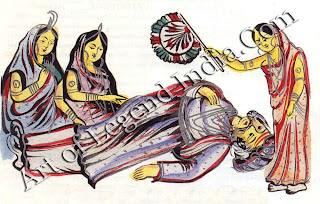 Kaikeyi
heard this with increasing alarm. It was true that she had always wanted
Bharata to be king, especially because Dasaratha had promised it so, and she
did resent Kausalya's seniority. Now Manthara's crooked words fed her fears and
ignited a resentment born of long frustration. Her lethargy turned to anger.
Kaikeyi
heard this with increasing alarm. It was true that she had always wanted
Bharata to be king, especially because Dasaratha had promised it so, and she
did resent Kausalya's seniority. Now Manthara's crooked words fed her fears and
ignited a resentment born of long frustration. Her lethargy turned to anger.
Perhaps
you speak the truth, Manthara. Maybe Rama should be sent away and Bharata put
on the throne. But how on earth could it be done?' 'You yourself have the
means, you told me in the past. Must I remind you?' Kaikeyi got up from her
bed. Her interest was definitely aroused.
Once
when Dasaratha was severely wounded on the battlefield, you saved his life by
taking him away to a safe place. At that time he offered you two boons. You
said you would ask for them later, to which he said, "So be it!" You
told me this long ago and I have treasured it ever since, waiting for the right
time to help you. Now you should ask for these two boons to be granted. First,
ask that Bharata be put on the throne. Second, demand that Rama be banished
from the kingdom for fourteen years,' exclaimed Manthara.
Kaikeyi
listened with excitement as Manthara told her to enter her chamber of wrath,
her private room for anger and depression, throw off her ornaments and finery,
loosen her hair and lie on the floor. When her husband would find her there she
must weep and wail and wait for him to offer her what she wanted.
He will
offer you jewels and gifts. Do not accept them. Fix your mind only on the
throne for Bharata and banishment for Rama.
Manthara
made her put on old clothes and sent her to the chamber of wrath. The delicate
queen untied her hair and threw herself upon the ground, scattering her
ornaments about her. Tossing from side to side she began to work herself into a
frenzy.
 If Rama
becomes king your life will be misery and your son will surely be killed!'
Manthara goaded her.
If Rama
becomes king your life will be misery and your son will surely be killed!'
Manthara goaded her.
Either
Bharata will be crowned or I will eat nothing and stay here until I die,' said
Kaikeyi. Her face darkened by rage and her heart poisoned by Manthara's arrows
of hatred, she awaited her husband.
Dasaratha
had just seen Rama for the second time and evening was approaching. He had been
issuing orders all day and at last he felt confident that all was in hand for
the coronation. Now he looked forward to the enjoyable task of telling his dear
Kaikeyi the exciting news. As was his habit he went to find her in her bedroom.
Kaikeyi's
bedchamber was empty, her bed unused. He found one of her maids who told him
nervously that she was in her chamber of wrath. In dismay he entered the
darkened room and found her sprawled on the floor, like a creeper torn from a
tree, weeping piteously. He knelt beside her, but she pushed him away.
My
beloved, who has upset you? What is wrong? Let me put it right. If someone
needs to be punished I will punish them, or if someone must be rewarded I will
reward them.' The queen took no notice and continued to weep. 'I promise on my
honour that I will do whatever pleases you. I rule an empire stretching from
the southern Deccan to the Himalayas, from east of Bengal to west of Rajasthan.
Whatever you want is yours.' She turned to him. 'No one has insulted me,' she
sobbed, 'but there is some-thing I must have. Promise you will give it. Give me
your word and I shall tell you what it is.' She had Dasaratha at her mercy.
My
dear, I promise you shall have what you want. I swear on my beloved Rama,
without whom I could not live for even a day. I swear I will satisfy' your
desire. Please let me make you happy again.' Helplessly the emperor was drawn
into Kaikeyi's trap.
Indra
and the gods have heard your oath. The moon and sun bear witness to your words.
Now listen to me.' Kaikeyi's voice hardened. 'Remember when I saved your life
and ydlit offered me two boons? Now I want them. If you refuse me I promise I
will die. My first request is for Bharata to be installed on the throne in
place of Rama. My second is for Rama to be sent this very day to Dandaka Forest
for fourteen years to live as hermit.
Dasaratha
could not believe his ears. All day he had felt a sense of foreboding which now
turned to a throbbing in his head and pain in his heart. He collapsed on the
bare floor beside his queen and began to murmur.
0 pity!
Pity! Your words are cruel. What harm has Rama ever done you? When the whole
world loves him why should I send him away? Life might go on without the sun or
water, but I cannot live without Rama. I can't believe you mean what you say.
This is not you speaking, but some evil spirit that has entered you. I might
agree to put Bharata on the throne, but I will never banish Rama. Take pity on
me. I am old and weak. You can have anything I possess, but without Rama I will
die. But the emperor's weakness only served to strengthen Kaikeyi's resolve.
You
have given me your oath. Are you going back on your promise?' she tormented
him. 'Your word has no value? Banish Rama or I shall drink poison.
In vain
Dasaratha tried to reason with this cruel queen, by turns groaning and
pleading. How would Rama, who knew only fine food and soft beds, survive alone
in the forest? Rama was so noble and obedient that if asked he would go at once
with-out complaint, but what of Sita and Kausalya? Surely they would die of'
broken hearts without him. Indeed who would wish to stay in Ayodhya if he were
gone? Even Bharata would not stay. And Dasaratha would be ridiculed and die.
Kaikeyi would be left alone to preside over the collapse of the empire. But the
woman's heart was hard and cold and his words useless. Spent, he collapsed at
her feet, a broken man.
Darkness
fell and the palace became silent. Dasaratha lay unconscious. As the long night
passed, he drifted in and out of wakefulness, pleading and whimpering, and
dreading the arrival of dawn. The queen, however, was alert with angry
determination. As the sky lightened she commanded Dasaratha to send for Rama.
0
kings, awake, for today is a glorious day,' he called. 'As the sun wakes the
world so do I wake you. Vasistha is here and all is ready. Come and order the
installation of' Rama.' From the shadows emerged the emperor, red-eyed and
feeble.
I am
not asleep, Sumantra. Silence, please. You are only making things worse.' The
emperor collapsed onto a couch and Kaikeyi stepped forward.
He was
unable to sleep last night in anticipation of today's coronation,' said
Kaikeyi. Now he is exhausted. Call Rama to come here at once.' Sumantra
hesitated, waiting for the emperor's approval.
Do as
she says -bring Rama,' murmured the emperor. Sumantra hurried to fetch him.
Hearing that his father wanted him, Rama came out of his palace like a lion
from his mountain cave. Joined by Lakshmana he mounted his chariot, inlaid with
gems and gold, and moved in state procession through the city. The crowd
followed him right up to the inner gate of the palace, where they waited for
his return as the ocean waits for the moon.
Rama
went inside with Lakshmana. As soon as he saw his father he knew some-thing was
terribly wrong. He was sitting with Kaikeyi on her bed, his face black with
despair like the sun in an eclipse. Rama bowed at save to falteringly repeat
the name 'Rama', and his turned to Kaikeyi in alarm.
What
has upset my father? Rama demanded. Why is he in such a state?'
The
emperor is not angry. He has something himself' to say the words. If you
promise to carry On his own he will never tell you.'
Mother,
you know that I will do anything for my father. If he wishes I will drink
poison. Tell me his wish and I shall execute it. Rama never goes back on his
word!'
Long
ago your father offered me two boons, and now I am claiming them. I have asked
him to install Bharata on the throne in your place and to exile you to Dandaka
Forest for fourteen years where you are to live as an ascetic. Now you know why
your father cannot look you in the face.
These
words made Lakshmana recoil in anger and dismay, but Rama heard them without
flinching. His voice remained even-tempered as he replied:
lf the
emperor has promised you this then without hesitation I shall go to the
forest.' Kaikeyi was delighted to rind Rama so cooperative. Shamelessly she
pushed home her advantage, urging him not to waste time in getting ready to
leave.
I am
not attached to worldly comfort, and I will happily live in the forest for
four-teen years. I do not need to hear it personally from my father. Your word
as my mother
SADHUS & ASHRAMS
DURING
HIS exile Rama met many sadhus, holy men or women, living in the forest. In
modern India, Sadhus are still an important part of Hindu life. They practice
detachment From the world, following the advice of Krishna in the
Bhagavad-Gita: 'Happiness and distress appear and disappear like the passing of
winter and summer They arise from the perception of the senses and you must
learn to tolerate them without being disturbed.'
his
feet. Dasaratha could not speak eyes were blinded with tears. Rama Have I
angered him in some way? to ask of you but he cannot bring out his wish This
renunciation sets an example to the rest of society and makes sadhus the object
of veneration to ordinary people. Even today a genuine sadhu ranks higher than
anyone in Hindu society.
An
advanced sadhu may become a guru and accept disciples who live with their
teacher in the ashram, or place of spiritual shelter. They follow a daily
routine beginning before dawn with bathing, worship and study of' the
scriptures. Sadhus and their disciples often take vows of celibacy.
 Is
sufficient, and I will leave today. Make sure Bharata is brought here at once
to protect the kingdom and look after my poor ageing father.' So saying Rama
bowed before his weeping father and the hateful Kaikeyi and strode purposefully
out of the palace, taking with him Lakshmana, whose eyes were brimming with
tears of anger.
Is
sufficient, and I will leave today. Make sure Bharata is brought here at once
to protect the kingdom and look after my poor ageing father.' So saying Rama
bowed before his weeping father and the hateful Kaikeyi and strode purposefully
out of the palace, taking with him Lakshmana, whose eyes were brimming with
tears of anger.
Rama
emerged into the sunlight before the waiting crowd. He sent away his chariot
and royal attendants and insisted on walking on foot to see his mother. As he
entered her chamber, he saw that she was in the midst of her morning worship,
praying for blessings for his installation. Happily, she embraced him. Rama
held her tight.
Mother,
I have painful news for you. The emperor has decided to give the throne to
Bharata and has sent me away to the forest for fourteen years where I must live
as a hermit, feeding on roots and herbs.
The
queen trembled. The blood drained from her face. She opened her mouth but no
sound came out. Rama caught her as she fell and held her in his arms.
My
son!' she stammered, 'I would rather have stayed childless than have to hear
such words. I cannot bear the pain of losing you. Let death take me.' Lakshmana
could stay silent no longer.
The
emperor is out of his mind. He is so attached to Kaikeyi that he does not know
what he is saying,' he burst out, 'No son should have to obey a senile old man
when he is in this state. I should kill him rather than see Rama go.'
Listen
to your brother, Rama! Such terrible words have never been spoken in this
family. And if you leave I will fast to death. Give up this madness,' said his
mother.
Mother,
this is not madness. This is my sacred duty. I must obey my father. Don't
despair I shall return after fourteen years.' Rama was calm and unmoved. He
turned to his brother. 'Truth is the source of our strength, Lakshmana, and
must never be given up. There is no use in making threats.' Kausalya cried
without control; Lakshmana shook with anger; and Rama stood between them.
Lakshmana,
you must understand that truthfulness and honour come before every-thing. I am
bound by my father's order. I would rather live in the forest with nothing than
rule a kingdom at the cost of my honour. Do not blame Kaikeyi or the emperor
for this turn of events. How could Kaikeyi have ever thought of such a thing
herself? It is not her doing. They are both under the control of providence. I
am also under the same control. I accept this as the will of God.
Lakshmana,
however, was wild-eyed and ready to defend Rama by force. 'This is a conspiracy,
don't you see? he cried out. 'This story of vows has been fabricated to get rid
of you. If it is true, why did we not hear it before? As for your honour, your
surrender to fate will be interpreted as weakness and your piety ridiculed. We
must fight for what we know is right, not meekly surrender. Tell me who your
enemies are and I will destroy them. They will never send you away.'
Lakshmana's voice broke with emotion as he wiped away tears of frustration.
Rama caught his hand and tried to soothe him.
I know
you love me, Lakshmana, and I know you want to help me. Instead of threatening
violence on my behalf, use your energies to get everything ready for my
departure. I must leave as soon as possible.
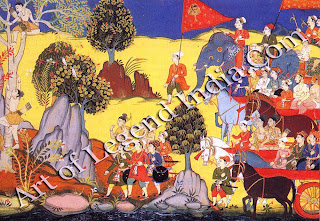 Kausalya
saw it was useless to try to dissuade Rama. She felt the misery building up
inside her, threatening to consume her like a forest fire. She pleaded with
Rama that if he must go, let him take her with him. She would look after him
and prepare his food. But Rama was adamant.
Kausalya
saw it was useless to try to dissuade Rama. She felt the misery building up
inside her, threatening to consume her like a forest fire. She pleaded with
Rama that if he must go, let him take her with him. She would look after him
and prepare his food. But Rama was adamant.
Poor
father will not survive if' both of' us desert him. Dear mother, you know that
a woman's duty is to serve her husband.'
Go
then, and may the gods protect you. I will wait for your return, my beloved
son!
She
gathered flowers and incense and chanted hymns, imploring Vishnu to protect her
boy. She tied on his wrist an amulet blessed with sacred mantras. Her eyes
streaming tears, she held him in her embrace, and smiled bravely. 'I can see
you now, dear boy, returning from the forest your face shining as you run
towards me, your arms reaching out to embrace me. You are dressed in forest
barks with leaves in your hair.
Rama
loosened her hold and made to go. 'Hurry back my child,' she cried, 'I cannot
wait for long.' He slipped from her grasp.
Writer
– Ranchor Prime
 Not
surprisingly, of all his sons Dasaratha loved Rama the most. Emperor Dasaratha
was getting old, and seeing how well Rama was doing he decided to pass control
of the kingdom over to him. Bad omens had been seen recently, which further
convinced him that he should place responsibility for the kingdom into younger
and more capable hands. He called together his ministers and advisers and put
it to them that it was time to hand over to Rama, but he did not invite Bharata
to be present. One reason for this was that Bharata was far away, staying with
his uncle Yudhajit, in the state of Kekaya. But there was another reason.
Dasaratha had once promised to Kaikeyi's father that her son would be crowned
king of Ayodhya. In view of this, he thought it best not to give Bharata the
opportunity to object to Rama's coronation.
Not
surprisingly, of all his sons Dasaratha loved Rama the most. Emperor Dasaratha
was getting old, and seeing how well Rama was doing he decided to pass control
of the kingdom over to him. Bad omens had been seen recently, which further
convinced him that he should place responsibility for the kingdom into younger
and more capable hands. He called together his ministers and advisers and put
it to them that it was time to hand over to Rama, but he did not invite Bharata
to be present. One reason for this was that Bharata was far away, staying with
his uncle Yudhajit, in the state of Kekaya. But there was another reason.
Dasaratha had once promised to Kaikeyi's father that her son would be crowned
king of Ayodhya. In view of this, he thought it best not to give Bharata the
opportunity to object to Rama's coronation.  My
dreams are troubled by omens, meteors have been sighted, and my astrologers
have warned that the planets are against me,' Dasaratha told him. 'They say I
must take advantage of tomorrow's favourable moon to crown you before it is too
late. I am worried about Bharata. He is your loyal and honest brother and he is
far away, but he may lay claim to the throne.
We must be on our guard tonight. To ward off bad for-tune you and Sita
should observe a fast through the night and sleep on the bare floor.
My
dreams are troubled by omens, meteors have been sighted, and my astrologers
have warned that the planets are against me,' Dasaratha told him. 'They say I
must take advantage of tomorrow's favourable moon to crown you before it is too
late. I am worried about Bharata. He is your loyal and honest brother and he is
far away, but he may lay claim to the throne.
We must be on our guard tonight. To ward off bad for-tune you and Sita
should observe a fast through the night and sleep on the bare floor. Kaikeyi
heard this with increasing alarm. It was true that she had always wanted
Bharata to be king, especially because Dasaratha had promised it so, and she
did resent Kausalya's seniority. Now Manthara's crooked words fed her fears and
ignited a resentment born of long frustration. Her lethargy turned to anger.
Kaikeyi
heard this with increasing alarm. It was true that she had always wanted
Bharata to be king, especially because Dasaratha had promised it so, and she
did resent Kausalya's seniority. Now Manthara's crooked words fed her fears and
ignited a resentment born of long frustration. Her lethargy turned to anger.  If Rama
becomes king your life will be misery and your son will surely be killed!'
Manthara goaded her.
If Rama
becomes king your life will be misery and your son will surely be killed!'
Manthara goaded her.  Is
sufficient, and I will leave today. Make sure Bharata is brought here at once
to protect the kingdom and look after my poor ageing father.' So saying Rama
bowed before his weeping father and the hateful Kaikeyi and strode purposefully
out of the palace, taking with him Lakshmana, whose eyes were brimming with
tears of anger.
Is
sufficient, and I will leave today. Make sure Bharata is brought here at once
to protect the kingdom and look after my poor ageing father.' So saying Rama
bowed before his weeping father and the hateful Kaikeyi and strode purposefully
out of the palace, taking with him Lakshmana, whose eyes were brimming with
tears of anger.  Kausalya
saw it was useless to try to dissuade Rama. She felt the misery building up
inside her, threatening to consume her like a forest fire. She pleaded with
Rama that if he must go, let him take her with him. She would look after him
and prepare his food. But Rama was adamant.
Kausalya
saw it was useless to try to dissuade Rama. She felt the misery building up
inside her, threatening to consume her like a forest fire. She pleaded with
Rama that if he must go, let him take her with him. She would look after him
and prepare his food. But Rama was adamant. 
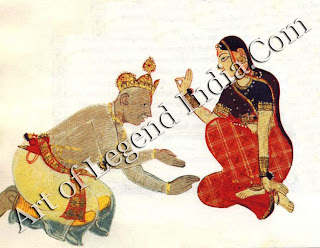
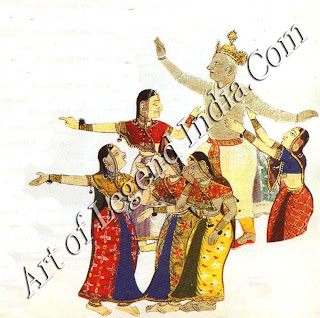
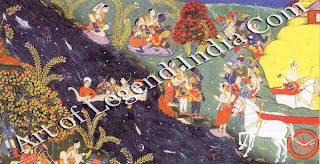











0 Response to "Ayodhya Kanda I of Ramayana"
Post a Comment